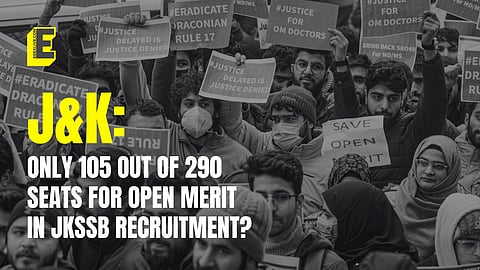

The long-standing concerns of open merit aspirants in Jammu & Kashmir have escalated once again following the latest recruitment notification by the Jammu and Kashmir Services Selection Board (JKSSB) for Junior Engineer (JE) posts.
As per an official notification released yesterday, February 27, out of the 292 available posts, only 117 have been allocated under the open merit category, with an additional 12 seats quietly absorbed through horizontal reservation. This leaves only 105 seats truly available for open merit candidates.
Moreover, aspirants have raised concerns that even these 105 seats are not exclusively for open merit candidates, as reserved category aspirants scoring higher than the cut-off can still claim them.
Years of waiting, yet no opportunities
Aspiring job-seekers in Jammu and Kashmir stressed that while the limited number of vacancies is a concern, the bigger issue is that the recruitment notification itself was released after more than eight years, with the last recruitment held in 2016.
Sinan, an aspiring JE candidate and a National Institute of Technology (NIT) Srinagar graduate, highlighted the dire lack of vacancies for Electrical Engineering posts in J&K.
"There has already been a decade-long backlog in new notifications, leaving thousands of engineers without opportunities. Now, even with the new notification, only 107 open merit seats are available, but past trends indicate that 30-40 of these will go to reserved category candidates. That leaves barely 60-70 seats for general category aspirants, who make up nearly 79 per cent of applicants," he told EdexLive.
The limited scope for Electrical Engineering graduates has only deepened their frustration.
“There are huge hydropower projects in our state — Uri, Salal, Kishanganga — yet local engineers do not get recruited. Meanwhile, eligibility criteria for posts like SI Telecom were recently changed to include mechanical and electronics engineers but exclude electrical engineers. How is that justified?" Sinan asked.
“Every year, 700-800 Electrical Engineering graduates pass out from J&K colleges, and Electronics adds another 1,500. Where are they supposed to go? The private sector in J&K is nearly non-existent, and those who want to pursue higher education face uncertainty about their future,” he added.
Frustration mounts…
Delays in recruitment have further disheartened aspirants. Many have pursued higher education, hoping for better job prospects, only to find themselves still waiting.
“Some of my seniors who graduated in 2015, 2016, even 2017 went on to complete their master’s and PhDs,” Sinan said and added, “They were promised government jobs, but they’re still waiting. Some have had to take up menial jobs as clerks or peons just to survive.”
Mudasir, another aspirant, echoed these concerns as he shared, "The disparity in cut-offs is stark. Open merit candidates need over 85 marks to qualify, whereas RBA (Residents of Backward Areas) candidates get in with 70, others with 50-60, and Economically Weaker Section (EWS) candidates with as low as 40. This is not equal opportunity. We've tried multiple times to engage with the government, but they keep making empty promises."
Aspirants are now calling for an immediate rationalisation of the reservation system before the current recruitment process moves forward.
"We are urging the government to pause the recruitment process and conduct a fair review. If we do not get a fair share now, will we have to wait another decade for the next recruitment? Many of us will cross the age limit by then," Mudasir said.
Shrinking opportunities for open merit candidates
For over a year, General category aspirants in J&K have voiced their concerns over a sharp reduction in open merit seats in government exams and educational institutions. The controversy began in March 2024, when the Lieutenant Governor-led administration amended the Jammu & Kashmir Reservation Rules, 2005, significantly altering the seat distribution in education and government jobs.
In July 2024, the J&K government further reduced the open merit quota to 40 per cent in government job recruitments. The allocation for postgraduate medical courses plummeted to 26.6%, raising fears about fair seat distribution, particularly in speciality fields.
As protests gained momentum, Education Minister Sakina Itto announced a cabinet subcommittee to review the policy in December 2024. However, aspirants allege that the committee has made little progress, leaving them feeling neglected and disillusioned.
A lack of political will?
Frustrated by government inaction, aspirants, under the Open Merit Students Association J&K (OMSA), submitted a draft amendment bill advocating for a cap of 40 per cent on reserved seats and a 60 per cent allocation for open merit.
Mir Mujeeb, who headed this delegation, informed EdexLive that J&K Chief Minister Omar Abdullah assured them that various recruitment processes would slow down until the issue was addressed. The government also committed to rationalising the system in two phases.
“In Phase 1, they promised quick fixes within a month — issues like horizontal reservations and more. They also assured us that the EWS residential asset criteria would be removed, aligning with states like Rajasthan and Gujarat. Initially, they confirmed these changes were doable, but now, over two months later, nothing has been delivered,” Mujeeb said.
Phase 2 was supposed to focus on broader rationalisation, ensuring the open merit category gets its due share based on J&K's population ratio.
“We specifically asked for excessive reservations to be rationalised. The government gave itself six months, but three months have already passed with almost no progress. The subcommittee set up for this barely met once. This lack of action signals a lack of political will. At the very least, the government should implement what it can through an executive order,” he further said.
